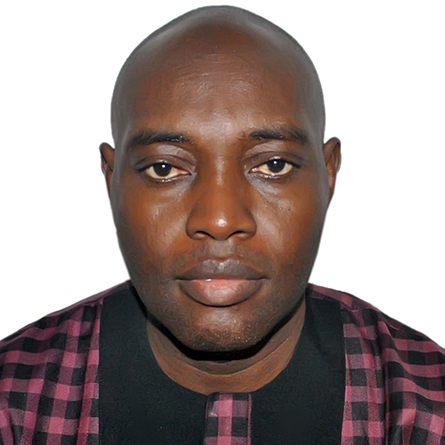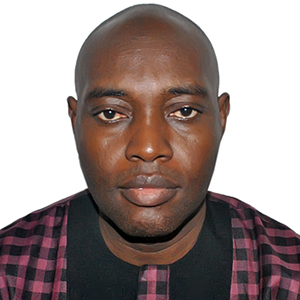
Seeing what I become: An academic journey
Starting in secondary school, I developed an interest in biological sciences and a natural love of chemistry, especially organic chemistry. I remember organizing chemistry tutorials for my classmates as a first-year university student. What I love most is relating structure to function — which is biochemistry.

I am the first born of my family, with 11 siblings. My father has four wives, and my mother is the first wife. My parents only attended high school, and I was the first in my family to go to college. As the oldest child, I made up my mind to go to school and make it in life so I could take care of my parents and siblings.
After secondary school, I gained admission to the University of Ibadan, Nigeria, to study veterinary medicine. Though I had wanted to study pharmacy due to my love for chemistry, this seemed like a miracle, because I’d thought I would not be able to complete even my secondary school education due to lack of funds. As fate would have it, my university education was sponsored by one of my father’s friends who works with Chevron Texaco Limited in Lagos, Nigeria. I was sponsored from my third year of the six-year doctor of veterinary medicine program. In Nigeria, an undergraduate degree is not required before admission to the DVM program.
I graduated from the University of Ibadan as one of the top 5% in my class. My keen interest in academics spurred me to continue with postgraduate studies in veterinary pharmacology and later biochemistry; I earned two master’s degrees.
I took up a Ph.D. program in 2010 at the University of Ibadan College of Medicine and Cape Peninsular University of Technology, Cape Town, South Africa, at the oxidative stress research center, with a special focus on cell signaling as a tool for unraveling molecular mechanisms of action for cardiovascular disease and its complications such as hypertension, renal damage and myocardial infarction.
I joined the academic staff of the department of veterinary physiology, biochemistry and pharmacology at the University of Ibadan as a young lecturer in September 2005, and I now head that department. In the lab, I study the use of medicinal plants, plant-derived products and nutraceuticals for the management of cardiovascular disease and complications such as hypertension, renal damage and diabetes mellitus. I also mentor young faculty members to help them shape their career paths and lessen their struggle along the academic ladder.
As a young researcher, I faced challenges including finding the right mentor and like-minded colleagues. It took me time to find a career path in cardiovascular pharmacology and cell signaling. One of my senior colleagues approached me after my Ph.D. to be part of a group starting a lab. That was the beginning, in 2013, of the cardio-renal laboratory, which to date has graduated three Ph.D. students and more than 30 masters and undergraduate DVM students. We have established collaborations with researchers from the United States, South Africa, Botswana, Namibia and Ghana. Eight of my undergraduate students are now in the U.S., and one is in Canada, all in Ph.D. programs.
I tell my young colleagues that there should be no limit to their vision. The academic road might be rough; however, it is what you start seeing from now that you become. I see myself becoming a renowned biochemist in the world and a mentor to up-and-coming biochemists.
Enjoy reading ASBMB Today?
Become a member to receive the print edition four times a year and the digital edition monthly.
Learn moreFeatured jobs
from the ASBMB career center
Get the latest from ASBMB Today
Enter your email address, and we’ll send you a weekly email with recent articles, interviews and more.
Latest in Opinions
Opinions highlights or most popular articles

Women’s health cannot leave rare diseases behind
A physician living with lymphangioleiomyomatosis and a basic scientist explain why patient-driven, trial-ready research is essential to turning momentum into meaningful progress.

Making my spicy brain work for me
Researcher Reid Blanchett reflects on her journey navigating mental health struggles through graduate school. She found a new path in bioinformatics, proving that science can be flexible, forgiving and full of second chances.

The tortoise wins: How slowing down saved my Ph.D.
Graduate student Amy Bounds reflects on how slowing down in the lab not only improved her relationship with work but also made her a more productive scientist.

How pediatric cataracts shaped my scientific journey
Undergraduate student Grace Jones shares how she transformed her childhood cataract diagnosis into a scientific purpose. She explores how biochemistry can bring a clearer vision to others, and how personal history can shape discovery.

Debugging my code and teaching with ChatGPT
AI tools like ChatGPT have changed the way an assistant professor teaches and does research. But, he asserts that real growth still comes from struggle, and educators must help students use AI wisely — as scaffolds, not shortcuts.

AI in the lab: The power of smarter questions
An assistant professor discusses AI's evolution from a buzzword to a trusted research partner. It helps streamline reviews, troubleshoot code, save time and spark ideas, but its success relies on combining AI with expertise and critical thinking.

